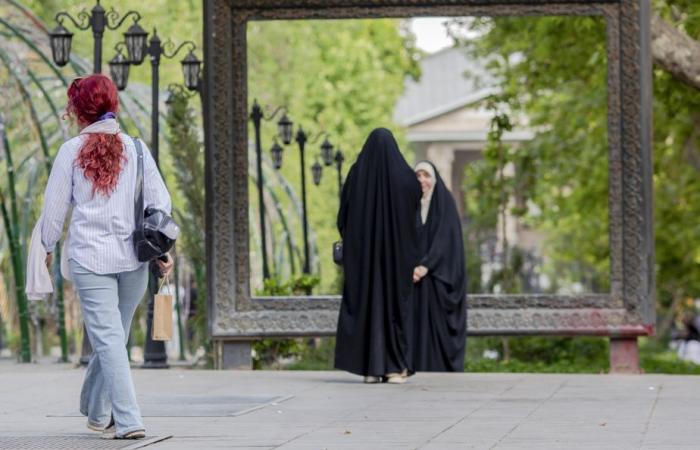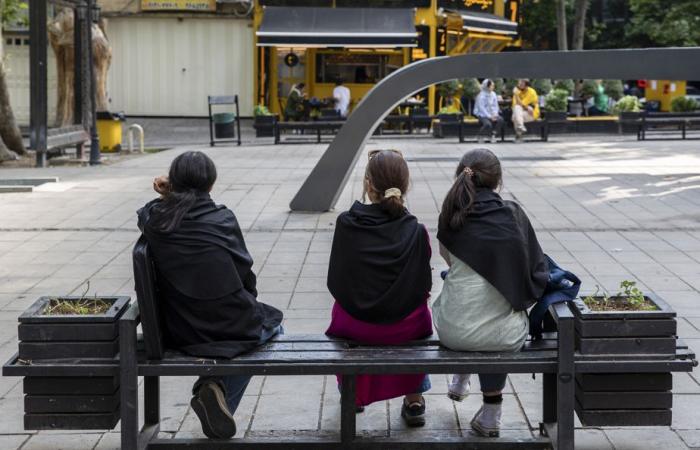For decades, Iranian authorities insisted that the law requiring women to cover their hair and dress modestly was sacrosanct and not even worth discussing. They dismissed the struggle of women challenging the law as a symptom of Western interference.
Posted at 2:30 a.m.
Updated at 6:00 a.m.
Farnaz Fassihi and Leily Nikounazar
The New York Times
As Iran holds a presidential election this week, the issue of requiring people to wear the hijab, or covering their hair, has become a hot campaign topic. The six candidates, including five conservatives, sought to distance themselves from the methods used to enforce the law, namely violence, arrests and fines.
“Elections aside, politics aside, under no circumstances should we treat Iranian women with such cruelty,” said Mustafa Pourmohammadi, a conservative presidential candidate and cleric who played a leading role in Iran’s services. intelligence, during a round table organized last week by state television. He also said that government officials should be punished for the hijab law because it was their duty to educate women on why they should wear the hijab, not to enforce it violently.
The hijab has long been a symbol of religious identity, but also a political tool in Iran. Women have resisted the law, in different ways, since it came into force after the 1979 Islamic Revolution.
It is unlikely that the law will be overturned, and it is not certain that a new president will be able to relax its application. Different administrations have adopted more or less strict approaches to the hijab.
Ebrahim Raïssi, president whose death in a helicopter crash in May prompted an emergency election, had imposed some of the harshest measures against women.
However, some women’s rights activists and Iranian analysts believe that forcing the issue during the elections is itself an achievement. This shows that the “Women, Life, Liberty” civil disobedience movement, which began almost two years ago, has become too big to ignore.
Women and girls walk the streets, eat in restaurants, go to work, and use public transportation wearing dresses, skirts, and petticoats, and leaving their hair uncovered. In doing so, they take great risks, as the moral police prowl the street corners to arrest women who defy the rules.
Transcending borders
Fatemeh Hassani, 42, a sociologist in Tehran, said in a telephone interview that the fact that the hijab and moral policing had become an electoral issue showed that women, through their determination and resistance, had “managed to influence the country’s domestic policies and force the government to recognize their demands for increased rights.
Women make up about half of Iran’s 61 million voters. Although electoral apathy is high among government critics, opposition to the hijab law and moral policing is no longer limited to them. It has transcended boundaries between gender, religion and class, and the most vocal complaints now come from religious and conservatives, who constitute the backbone of the government’s voters.
In a live televised debate Friday on social issues, women and the hijab dominated the four-hour event. The issue has also surfaced in campaign videos that appear to target female voters and in rallies held in cities across the country.
In Isfahan, the video of a rally in favor of a candidate, the Dr Masoud Pezeshkian shows an 18-year-old girl, her long black hair flowing around her shoulders, taking the microphone. She said she represents the younger generation and new voters, the generation that stands up for their demands, and asked: “Do you have the power to take on the morality police, the hijab enforcers and the autonomous security forces?” »
Mr Pezeshkian is the only candidate from the reform faction, which favors greater social openness and engagement with the West. He has been the loudest voice against mandatory hijab and morality policing, and the only candidate to make it clear that he opposes telling anyone how to dress.
“We will not be able to force women to wear the hijab,” he said during Friday’s debate. “Will arrests, confrontations and shameful behavior solve this problem? »
For when ?
Not all voters are convinced that change is imminent. Despite the candidates’ convictions, the morality police continue to patrol the streets of Tehran and other major cities daily with vans and police cars. She sometimes intercepts women and gives them verbal notice, sometimes arrests them. Several videos posted on social media show women being beaten and dragged into vans.
“I don’t believe them. The president has no authority on this issue, because it is a red line for the Islamic Republic,” Sephideh, a 32-year-old teacher from Tehran, said in a telephone interview, asking that her name of family is not published in order to avoid possible reprisals. “But in the previous elections, the hijab issue was abandoned, and now they are all talking about it,” she added, concluding that the women’s struggle “will win.”
Iranian women who do not believe in wearing the hijab have been fighting against the law since it existed, that is, since the Islamic Revolution of 1979.
At the time, clerics who overthrew the monarchy imposed Islamic sharia law on every aspect of social life, from women’s dress to gender mixing to alcohol consumption.
The “Women, Life, Freedom” movement began in 2022 after the death of Mahsa Amini, 22, detained by the morality police, who had arrested her on charges of violating the hijab law . Outraged women and girls led protests across the country, burning their headscarves, dancing in the streets and chanting that women should be free. The uprising gained momentum and demanded an end to clerical power. The government ended up crushing the protests with violence.
In recent months, facial recognition software, installed in traffic surveillance cameras and drones, has been used to identify hijab violators, who then receive a summons by text message to appear in court, according to three women interviewed who received such messages and a report from Amnesty International.
PHOTO ARASH KHAMOOSHI, THE NEW YORK TIMES
Young women not wearing hijab in a Tehran park
Fahimeh, a 41-year-old fashion blogger, said in an interview in Tehran that the choice of the next president would have no impact on the fight for more rights. “We women do not wait for their permission to take off our hijab. Today, many people no longer wear the hijab. »
Narges Mohammadi, a Nobel Peace Prize laureate and Iran’s most prominent women’s rights activist who is currently serving a 10-year prison sentence, issued a statement on Saturday calling the election a sham .
“How can you, while you hold in one hand a sword, a gallows, weapons and prisons against the people, in the other hand place an urn before these same people and call them in a deceptive and lying manner to go to the polls ? “, declared M.me Mohammadi.
This article was published in the New York Times.
Read the original version (in English, subscription required)







